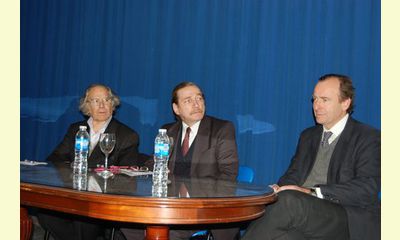|
|
Masterclass by Adolfo Perez Esquivel in UNNE (Argentina)
un article par Siete Puntas, Argentina
The Human Rights Free Chair of the National University of the Northeast (UNNE) hosted the seminar "Culture of Peace, Human Rights and Prevention of Violence." The closing lecture was given by the Nobel Peace Laureate, Adolfo Perez Esquivel.

Adolfo Pérez Esquivel (on left)
click on photo to enlarge
The UNNE seminar on "Culture of Peace, Human Rights and Violence Prevention" of the Chair of Human Rights and Citizenship of the UNNE took place on Tuesday August 28 beginning at 3:00 in the "G" room of the Faculty of Medicine .
The seminar included separate panels on human trafficking, gender violence and institutional violence and was attended by leading media professionals. In this regard and as host of them attendedby Dr. Norberto Liwski, Chairman of the Committee for the Defense of Health, Ethics and Human Rights - CODESEDH -.
As a finishing touch at the closure of these activities, Adolfo Perez Esquivel, the Nobel Peace Laureate and a member of the Academic Council of the Department of Human Rights UNNE, gave a lecture to teachers, students and the general public.
The Rector Del Valle introduced Pérez Esquivel and acknowledged his commitment to the University saying that "the Department of Human Rights is the result of an agreement that was signed with the CODESEDH and which established the Human Rights Observatory of UNNE." He added that "this responds to the need for an institutional space for the main engagements that the University maintains with its environment, including its commitment to its actors and to the society."
On the topic of Human Rights Del Valle stressed the importance of "paying attention to vulnerable sectors of the populations such as indigenous peoples, victims of domestic violence, human trafficking and children."
The Nobel Peace Laureate, SERPAJ president and member of the Academic Council of the Department of Human Rights and Citizenship of the UNNE began his lecture by saying, "my work is for all terrains, it does not fall and is not muddied" recalling some of his experiences in different parts of the world.
He said "our societies are marked by individualism; in big cities we are lonely in crowds and we have no way to communicate." He added that this is due to "lack of a sense of community and the imposition of a politic of individualistic heroes through films which intoxicates our minds."
Pérez Esquivel defined peace as "an ongoing dynamic between individuals and peoples" and warned that "peace is not the absence of conflict because the wealth of the people is their diversity," adding that "we are different but we all have the same rights."
(This article is continued in the discussionboard)
(Click here for a Spanish version of this article)
|








|
DISCUSSION
Il n'y pas encore de question liée à cet article.
* * * * *
Commentaire le plus récent:
(The following is continued from the main article listed above.)
As an expert on the various conflicts that marked the twentieth century, the Argentine Nobel Laureate said, "when World War II ended, we hoped that we were going to end genocide and yet today there is genocide in the name of liberty, equality and peace." He continued, "when the Berlin Wall fell, we thought the world was going to unite but now there are walls that divide people on the border of the U.S. and Mexico letting in goods but not human beings."
During his speech, Adolfo Perez Esquivel, did not fail to discuss the politics of Human Rights carried on in this country and in the world. In this regard he stressed "the work and courage that it took for Argentine courts and judges to address the causes of crimes against humanity in our country with characteristics that are unique in the world."
"It's important to talk about human rights in addition to the events that took place in the last military dictatorship", he added, noting that "the pollution of natural resources, the children dying of hunger, poverty and abuse should be considered as well."
On combating individualism, he pointed out that two things must be present for the survival of collective consciousness: "Universities and schools must have a critical consciousness of rebellion; and we need regional organizations such as Mercosur and the Unasur. This is the best way not to lose our identity."
He concluded with a hopeful message that "there are many organizations working to generate transformations of the concrete realities of the people," and "even in places in the world with the most conflict, we can encounter a smile, and always where there is a smile, there is hope."

|
|









